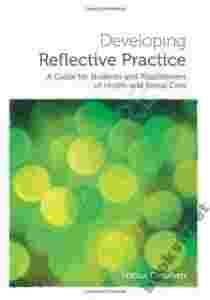From Reviews:"...In this book
the clinical psychologist Natius Oelofsen describes the
processes of learning and the three-step reflective
cycle, explaining how keeping a reflective journal
offers insights into self and behaviour, and using
critical analysis to reflect on even ordinary, everyday
incidents.
He shows how the insights of
understanding help our interactions with patients and
colleagues. Reflection helps us work together, offer
support and see where we are able to fit in as team
members. The chapter 'All for one and one for all:
building supportive teams' is particularly illuminating.
There is so much in this book, including getting the
most from supervision, ethical issues and dealing with
work-based stress, as well as exercises, activities and
case examples."
Nursing Standard,
Vol. 26, No. 48, August
2012
Developing Reflective
Practice is an essential companion for
practitioners and students in health and social care who
wish, or need, to incorporate reflective practice into
their workplace.
The material in this book is
suitable for students and practitioners in a variety of
fields, including nursing, psychology, social work,
therapeutic child care, and education.
What all
of these fields have in common is that practitioners
deal with fundamental human needs such as physical and
mental health, housing, and education.
Students
on placement as well as qualified and experienced
practitioners can benefit from reading this book and
working through the reflective exercises that accompany
the text.
The goal of the book is to help the
reader feel confident and competent when confronted with
complex and emotionally demanding situations in the
workplace. By working through the numerous and varied
activities and exercises detailed in this book, the
reader will acquire the skills needed to make sense of
their experiences in a professional context.
Contents
Part 1: Introducing
reflective practice
1. Reflecting on
reflection: Theories and perspectives on Reflective
Practice
2. How to reflect: The reflective
practitioner’s toolkit
Part 2:
Reflecting on the work in frontline services
3. Working with people’s stories: The role of
narrative in frontline practice
4. Shaping people’s
lives part one: Attachment and family Influences
5.
Shaping people’s lives part two: Cross-generational
influences and migration
Extended example: Narrative
and forces shaping people’s lives
6. Inside and
outside working relationships: Boundaries in frontline
practice
7. Getting to the heart of the matter:
Helping people change
8. Reflecting on what is really
important: Ethics and values in frontline practice
Extended example: Working with boundaries and change
Part 3: Reflecting on emotion in
frontline services 9. Absorbing distress:
Emotional Containment in frontline practice
10. When
strong feelings matter: Transference and
countertransference in frontline practice
Extended
example: Working with containment and transference
Part 4: Reflecting on staff support in
frontline services 11. All for one and one
for all: Building supportive teams
12. Making sense
of tangles, twists, and turns: Effective case
supervision in frontline practice
13. When the going
gets tough: Stress and burnout in frontline
services
Extended example: Stress and team
support.

